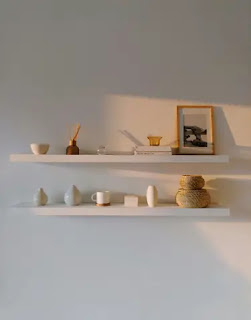In a world that is always
asking us to do more, be more, and buy more, it can be refreshing to step back
and re-evaluate what is truly important in life. This is the philosophy behind
minimalism, a movement that is gaining popularity in recent years.On a basic level,
minimalism is about living with less. This means consuming less, owning less,
and wasting less. In a society that is built on overconsumption, minimalism is
a powerful act of resistance.
There are many reasons why
people are drawn to minimalism. For some, it is a way to declutter their homes
and simplify their lives. For others, it is a way to save money or reduce their
ecological footprint. And for others still, it is a way to free themselves from
the constant pressure to consume.
Whatever the reason,
minimalism can be a transformative experience. Keep reading to learn more about
the power of minimalism and why we should all learn to live with less.
The Health Benefits of Minimalism
Minimalism has a lot of
benefits for our physical health. For starters, it can help us to declutter our
homes and workplaces. A cluttered environment can be chaotic and stressful,
which can take a toll on our mental and physical health. A study from the
Princeton University Neuroscience Institute found that physical clutter in our
surroundings can bog down our brains and hinder our ability to focus. The study
found that a cluttered environment can lead to information overload, which can
make it difficult to process information and make decisions. In addition to
decluttering our homes, minimalism can also help us to lead healthier
lifestyles. When we own fewer things, we have less to keep clean and organized.
This gives us more free time to focus on taking care of our bodies – whether
that means exercising, eating healthy, or getting enough sleep.
The Environmental Benefits of Minimalism
Minimalism also has a
lot of benefits for the environment. When we consume less, we generate less
waste. This is good news for our planet, which is struggling to deal with the
growing problem of plastic pollution. In addition to reducing our waste,
minimalism can also help us to consume less energy. For example, if we own
fewer appliances, we will use less electricity. And if we own fewer cars, we
will burn less gasoline. Over time, these small changes can make a big
difference in the environment.
The Economic Benefits of Minimalism
Minimalism can also help us to save money. When
we own fewer things, we have less to maintain and replace. We can also save
money on storage fees by decluttering our homes. And if we consume less, we
will have more money to invest in experiences and relationships – which
research has shown to be much happier than material possessions.
The Psychological Benefits of Minimalism
In addition to the physical and economic benefits
of minimalism, there are also psychological benefits. One of the most common
complaints in our society is that we never have enough time. We are always
rushing from one task to the next, and it can be difficult to relax and enjoy
our lives. Owning fewer things can help to simplify our lives and give us more
time to focus on the things that are truly important to us. Minimalism can also
help us to break the cycle of compulsive consumption. When we own less, we feel
less of a need to constantly buy new things. This can lead to a more fulfilling
and satisfying life.
Conclusion
Why living with less can
actually be freeing? For many people, living with fewer possessions enables
them to live lighter lives free from the burden of excess stuff. They report
feeling liberated from the need always buy new things or keep up with trends.
Not being preoccupied with material goods leaves more time available for
experiencing life, which some believe leads to increased levels of happiness.
In fact, studies show that money does not necessarily buy happiness, but how we
spend our time does. Therefore, those who use their extra time wisely may find
they are happier than those who don't because they are filling their days in
ways that bring meaning into their lives instead of simply acquiring more
belongings.
If you are interested in
simplifying your life, there are many resources available to help you get started.





.webp)


0 Comments